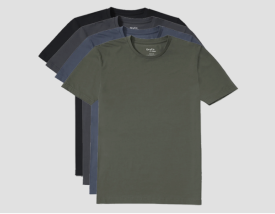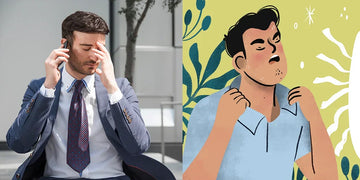Anxiety sweat isn’t just about nerves. It can feel like a full-on betrayal by your own body. One moment you’re calm, or at least trying to be. Next, your palms are slick, your underarms are soaked, and you’re hyper-aware of every drop. It’s not just uncomfortable. It’s distracting, embarrassing, and often makes your anxiety even worse.
This kind of sweat isn’t rare. It’s a common stress response, and for many people, it turns into a frustrating cycle. You feel anxious. You start to sweat. Then you feel more anxious because you’re sweating.
In this guide, we’ll break down what’s really going on in your body when anxiety triggers sweat. You’ll also learn how this connects to conditions like hyperhidrosis and what actually helps, from smart clothing choices to proven calming techniques that go beyond simply telling yourself to relax.
The Science: Why Anxiety Triggers Sweat
Your body is wired to keep you alive, not necessarily comfortable. When you’re anxious, your brain goes into fight or flight mode. This triggers the sympathetic nervous system, which fires off stress hormones like cortisol and adrenaline. These hormones rev up your heart, sharpen your focus, and activate your sweat glands.
But here’s the thing. It’s not the same sweat as when you’re hot or working out. Stress sweat comes from apocrine glands, which produce a thicker fluid that mixes with bacteria and creates that dreaded odor. These glands are concentrated in your armpits, groin, and scalp, which are basically all the places you wish would stay dry during an interview.
Not All Sweat Is Equal
Your body has two types of sweat glands:
● Eccrine glands: These are all over your body and produce light, watery sweat to cool you down.
● Apocrine glands: These live in select spots like your underarms and activate during emotional stress.
That’s why anxiety sweat tends to smell stronger and show up in all the wrong places. Unlike workout sweat, it doesn’t evaporate as quickly. This can leave you damp, uncomfortable, and self-conscious.
When Sweat Crosses the Line: Hyperhidrosis
For some people, anxious sweating isn’t just situational. It becomes a daily disruption. If you sweat excessively even when you’re not nervous, hot, or exercising, you might be dealing with hyperhidrosis.
There are two main types:
● Primary hyperhidrosis: Often starts in adolescence, targets specific areas like hands, feet, and underarms. It’s usually not linked to a medical condition.
● Secondary hyperhidrosis: Caused by underlying issues like thyroid problems, diabetes, or medication. This type usually leads to full-body sweating, even during sleep.
Hyperhidrosis often overlaps with anxiety. That combo can be brutal. Imagine stressing about a first date and whether your shirt is going to betray you five minutes in.
Common Anxiety Sweat Triggers
While everyone’s different, some scenarios tend to set off the sweat factory:
● Public speaking or interviews
● First dates and social events
● Unexpected video calls (hello, panic)
● Arguments or confrontations
● Big life changes (moving, parenting, starting a new job)
● Overstimulating foods and drinks (think caffeine, alcohol, spicy meals)
Recognizing your sweat triggers is half the battle. Once you know them, you can start making a game plan.
Smart Ways to Tackle the Anxiety-Sweat Loop
Let’s split this into two parts: calming the anxiety, and managing the physical sweat.
Both sides matter. If you only treat the sweat, the anxiety might still creep in. And if you only focus on mindset, the physical symptoms can keep reinforcing the fear. Tackling both gives you the best shot at breaking the cycle and feeling more in control.
Calm the Mind, Cool the Body
Therapy helps: Cognitive Behavioral Therapy (CBT) is a top pick for sweat-related anxiety. It helps rewire anxious thoughts. Exposure therapy gently nudges you out of the avoidance cycle.
Mindful practices matter: Deep breathing lowers your heart rate and your sweat response. Visualization and meditation help ground your thoughts before the spiral begins.
Lifestyle upgrades work: Get enough sleep. Move your body often. Exercise reduces baseline anxiety. Cut back on caffeine and alcohol, as they can spike sweat. Lean on your support circle. Don’t isolate yourself.
B. Manage the Sweat Like a Pro
Go tactical: Use clinical-strength antiperspirants, ideally at night. Keep on-the-go wipes or sprays handy for midday touch-ups.
Dress smarter: Choose moisture-wicking and breathable fabrics that help sweat evaporate quickly. If sweat is a daily issue, consider wearing a hyperhidrosis undershirt. These are built to absorb sweat and keep it away from your outer layer, so you can move through your day without broadcasting your anxiety.
Time to buy a sweat proof shirt: A well-designed sweat proof shirt can be a game-changer. Look for options with layered barrier fabrics that trap sweat while staying invisible from the outside.
When to Call in the Pros
It might be time to see a doctor or therapist if:
● Sweat interferes with your work, relationships, or daily life
● You find yourself avoiding people or situations because of it
● You have unexplained night sweats or sudden changes in sweat pattern
● Symptoms are paired with things like chest pain or rapid heartbeat
Doctors can run sweat tests, check for underlying health conditions, and refer you to dermatologists or mental health pros as needed.
Frequently Asked Questions
Can anxiety sweat be a sign of a medical condition?
In some cases, yes. If you sweat excessively even when you're not anxious, hot, or exercising, it might be hyperhidrosis. This can sometimes be linked to underlying conditions like thyroid disorders or diabetes. It’s worth speaking with a doctor if symptoms persist.
Will using stronger deodorant stop anxiety sweat?
Deodorant masks odor, but antiperspirants are what block sweat. Clinical-strength antiperspirants can significantly reduce sweat, especially when applied at night when glands are less active.
Are sweat proof shirts actually effective?
Yes. Sweat proof shirts are designed with multiple layers that absorb moisture and prevent it from reaching your outer clothing. They can help you stay dry and confident, especially during high-stress situations.
Can certain foods or drinks make anxiety sweat worse?
Absolutely. Caffeine, spicy foods, and alcohol can all trigger your nervous system and increase sweating. Managing your intake of these can help reduce episodes of stress sweat.
What treatments are available if lifestyle changes don’t help?
Medical options include Botox injections, which block sweat glands, prescription medications like anticholinergics, and procedures like miraDry or iontophoresis. These are typically recommended for more severe cases of hyperhidrosis.
Is anxiety sweat something I just have to live with?
Not at all. With the right combination of stress management techniques, smart clothing choices, and medical guidance if needed, you can take control of both the anxiety and the sweat it causes.
Final Thoughts
Sweat doesn’t define you. It doesn’t reflect your character, your capability, or your worth. Whether you’re dealing with social anxiety, hyperhidrosis, or the occasional clammy-palmed panic moment, there are ways to take back control and even feel confident again.
From therapy to fabric tech, your options are real, practical, and empowering. And if you're ready to buy a sweat proof shirt or test out a hyperhidrosis undershirt, you're not just buying fabric, you're investing in peace of mind.
You deserve to be comfortable in your own skin (and shirt).








